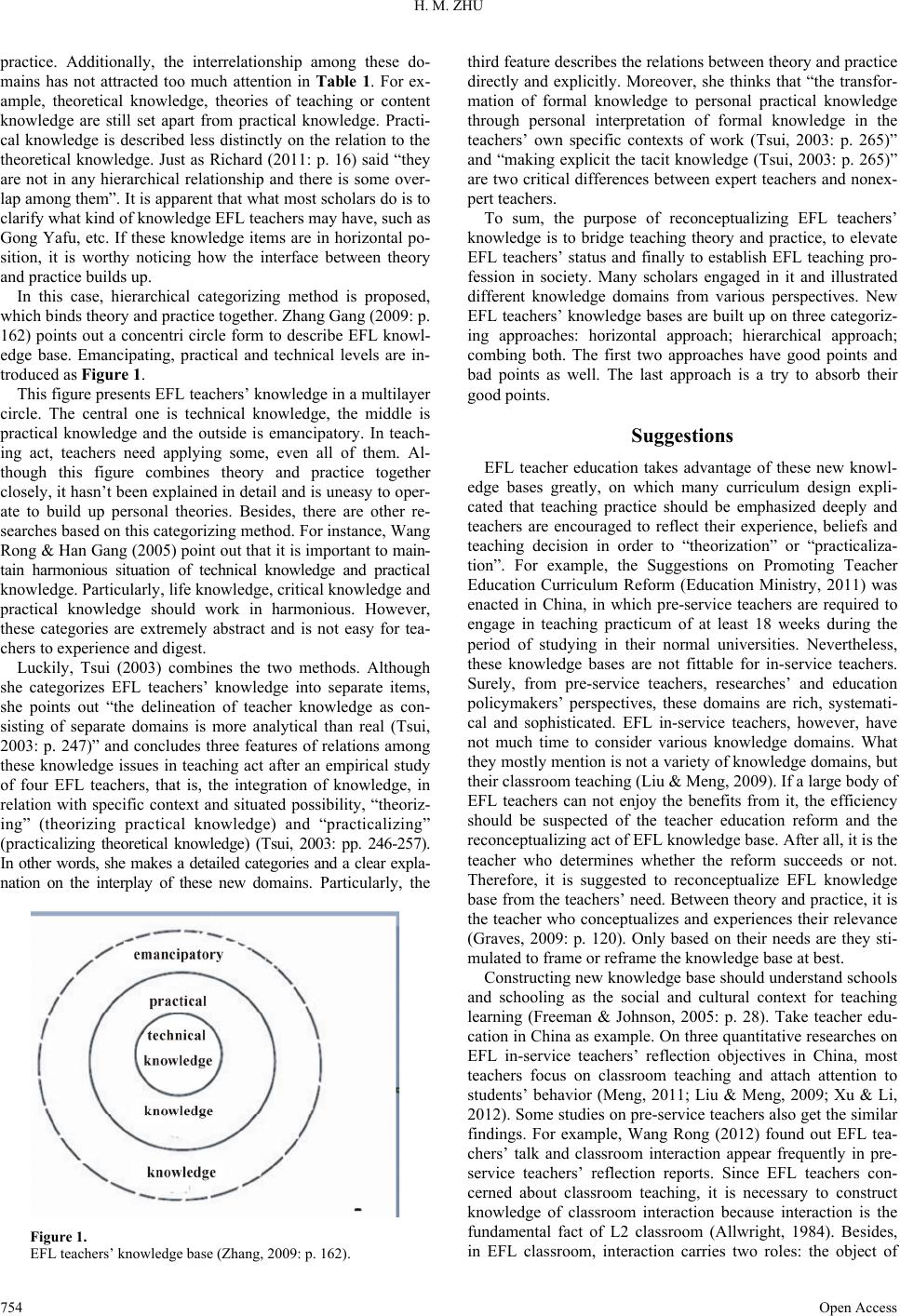
H. M. ZHU
Open Access
754
practice. Additionally, the interrelationship among these do-
mains has not attracted too much attention in Table 1. For ex-
ample, theoretical knowledge, theories of teaching or content
knowledge are still set apart from practical knowledge. Practi-
cal knowledge is described less distinctly on the relation to the
theoretical knowledge. Just as Richard (2011: p. 16) said “they
are not in any hierarchical relationship and there is some over-
lap among them”. It is apparent that what most scholars do is to
clarify what kind of knowledge EFL teachers may have, such as
Gong Yafu, etc. If these knowledge items are in horizontal po-
sition, it is worthy noticing how the interface between theory
and practice builds up.
In this case, hierarchical categorizing method is proposed,
which binds theory and practice together. Zhang Gang (2009: p.
162) points out a concentri circle form to describe EFL knowl-
edge base. Emancipating, practical and technical levels are in-
troduced as Figure 1.
This figure presents EFL teachers’ knowledge in a multilayer
circle. The central one is technical knowledge, the middle is
practical knowledge and the outside is emancipatory. In teach-
ing act, teachers need applying some, even all of them. Al-
though this figure combines theory and practice together
closely, it hasn’t been explained in detail and is uneasy to oper-
ate to build up personal theories. Besides, there are other re-
searches based on this categorizing method. For instance, Wang
Rong & Han Gang (2005) point out that it is important to main-
tain harmonious situation of technical knowledge and practical
knowledge. Particularly, life knowledge, critical knowledge and
practical knowledge should work in harmonious. However,
these categories are extremely abstract and is not easy for tea-
chers to experience and digest.
Luckily, Tsui (2003) combines the two methods. Although
she categorizes EFL teachers’ knowledge into separate items,
she points out “the delineation of teacher knowledge as con-
sisting of separate domains is more analytical than real (Tsui,
2003: p. 247)” and concludes three features of relations among
these knowledge issues in teaching act after an empirical study
of four EFL teachers, that is, the integration of knowledge, in
relation with specific context and situated possibility, “theoriz-
ing” (theorizing practical knowledge) and “practicalizing”
(practicalizing theoretical knowledge) (Tsui, 2003: pp. 246-257).
In other words, she makes a detailed categories and a clear expla-
nation on the interplay of these new domains. Particularly, the
Figure 1.
EFL teachers’ knowledge base (Zhang, 2009: p. 162).
third feature describes the relations between theory and practice
directly and explicitly. Moreover, she thinks that “the transfor-
mation of formal knowledge to personal practical knowledge
through personal interpretation of formal knowledge in the
teachers’ own specific contexts of work (Tsui, 2003: p. 265)”
and “making explicit the tacit knowledge (Tsui, 2003: p. 265)”
are two critical differences between expert teachers and nonex-
pert teachers.
To sum, the purpose of reconceptualizing EFL teachers’
knowledge is to bridge teaching theory and practice, to elevate
EFL teachers’ status and finally to establish EFL teaching pro-
fession in society. Many scholars engaged in it and illustrated
different knowledge domains from various perspectives. New
EFL teachers’ knowledge bases are built up on three categoriz-
ing approaches: horizontal approach; hierarchical approach;
combing both. The first two approaches have good points and
bad points as well. The last approach is a try to absorb their
good points.
Suggestions
EFL teacher education takes advantage of these new knowl-
edge bases greatly, on which many curriculum design expli-
cated that teaching practice should be emphasized deeply and
teachers are encouraged to reflect their experience, beliefs and
teaching decision in order to “theorization” or “practicaliza-
tion”. For example, the Suggestions on Promoting Teacher
Education Curriculum Reform (Education Ministry, 2011) was
enacted in China, in which pre-service teachers are required to
engage in teaching practicum of at least 18 weeks during the
period of studying in their normal universities. Nevertheless,
these knowledge bases are not fittable for in-service teachers.
Surely, from pre-service teachers, researches’ and education
policymakers’ perspectives, these domains are rich, systemati-
cal and sophisticated. EFL in-service teachers, however, have
not much time to consider various knowledge domains. What
they mostly mention is not a variety of knowledge domains, but
their classroom teaching (Liu & Meng, 2009). If a large body of
EFL teachers can not enjoy the benefits from it, the efficiency
should be suspected of the teacher education reform and the
reconceptualizing act of EFL knowledge base. After all, it is the
teacher who determines whether the reform succeeds or not.
Therefore, it is suggested to reconceptualize EFL knowledge
base from the teachers’ need. Between theory and practice, it is
the teacher who conceptualizes and experiences their relevance
(Graves, 2009: p. 120). Only based on their needs are they sti-
mulated to frame or reframe the knowledge base at best.
Constructing new knowledge base should understand schools
and schooling as the social and cultural context for teaching
learning (Freeman & Johnson, 2005: p. 28). Take teacher edu-
cation in China as example. On three quantitative researches on
EFL in-service teachers’ reflection objectives in China, most
teachers focus on classroom teaching and attach attention to
students’ behavior (Meng, 2011; Liu & Meng, 2009; Xu & Li,
2012). Some studies on pre-service teachers also get the similar
findings. For example, Wang Rong (2012) found out EFL tea-
chers’ talk and classroom interaction appear frequently in pre-
service teachers’ reflection reports. Since EFL teachers con-
cerned about classroom teaching, it is necessary to construct
knowledge of classroom interaction because interaction is the
fundamental fact of L2 classroom (Allwright, 1984). Besides,
in EFL classroom, interaction carries two roles: the object of